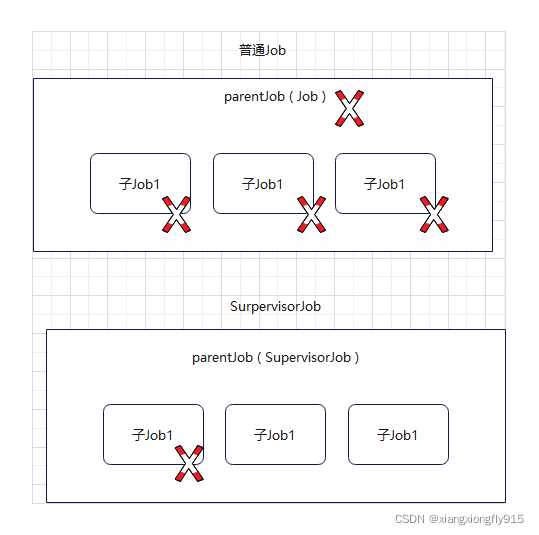文章目录
Kotlin 协程的异常处理
概述
协程是互相协作的程序,协程是结构化的。
如果把Java的异常处理机制,照搬到Kotlin协程中,一定会遇到很多的坑。
Kotlin协程中的异常主要分两大类
- 协程取消异常(CancellationException)
- 其他异常
异常处理六大准则
- 协程的取消需要内部配合
- 不要轻易打破协程的父子结构
- 捕获了
CancellationException后,需要考虑是否重新抛出来 - 不要用
try-catch直接包裹launch、async - 灵活使用
SurpervisorJob,控制异常传播的范围 - 使用
CoroutineExceptionHandler处理复杂结构的协程异常,仅在顶层协程中起作用
核心理念:协程是结构化的,异常传播也是结构化的。
准则一:协程的取消需要内部配合
问题:cancel不被响应
fun main() = runBlocking {
val job = launch(Dispatchers.Default) {
var i = 0
while (true) {
Thread.sleep(500L)
i++
println("i= $i")
}
}
delay(2000L)
job.cancel()
job.join()
println("end")
}
/*
输出结果:
i= 1
i= 2
i= 3
... //不会停止,一直执行
*/
解决:使用isActive判断是否处于活动状态
fun main() = runBlocking {
val job = launch(Dispatchers.Default) {
var i = 0
while (isActive) {
Thread.sleep(500L)
i++
println("i= $i")
}
}
delay(2000L)
job.cancel()
job.join()
println("end")
}
/*
输出结果:
i= 1
i= 2
i= 3
i= 4
end
*/
准则二:不要打破协程的父子结构
问题:子协程不会跟随父协程一起取消
协程的优势在于结构化并发,它的许多特性都是建立这个特性之上的,如果我们无意中打破了它的父子结构关系,就会导致协程代码无法按照预期执行。
val fixedDispatcher = Executors.newFixedThreadPool(2) {
Thread(it, "MyFixedThread").apply { isDaemon = false }
}.asCoroutineDispatcher()
fun main() = runBlocking {
val parentJob = launch(fixedDispatcher) {
launch(Job()) {
var i = 0
while (isActive) {
Thread.sleep(500L)
i++
println("子协程1:i= $i")
}
}
launch {
var i = 0
while (isActive) {
Thread.sleep(500L)
i++
println("子协程2:i= $i")
}
}
}
delay(2000L)
parentJob.cancel()
parentJob.join()
println("end")
}
/*
输出结果:
子协程2:i= 1
子协程1:i= 1
子协程2:i= 2
子协程1:i= 2
子协程1:i= 3
子协程2:i= 3
子协程2:i= 4
子协程1:i= 4
end
子协程1:i= 5
子协程1:i= 6
...... //子协程1不会停止
*/
说明:协程是结构化的,通常情况下,当取消了父协程,子协程也会被取消。但是在这里,子协程1不再是parentJob的子协程,打破了原有的结构化关系。
解决:不破坏父子结构
fun main() = runBlocking {
val parentJob = launch(fixedDispatcher) {
launch {
var i = 0
while (isActive) {
Thread.sleep(500L)
i++
println("子协程1:i= $i")
}
}
launch {
var i = 0
while (isActive) {
Thread.sleep(500L)
i++
println("子协程2:i= $i")
}
}
}
delay(2000L)
parentJob.cancel()
parentJob.join()
println("end")
}
/*
输出结果:
子协程1:i= 1
子协程2:i= 1
子协程2:i= 2
子协程1:i= 2
子协程1:i= 3
子协程2:i= 3
子协程1:i= 4
子协程2:i= 4
end
*/
准则三:捕获CancellationException需要重新抛出来
准则一中的Thread.sleep可以替代为delay,delay()函数可以自动检测当前的协程是否已经被取消,如果已经被取消,则会抛出CancellationException异常,从而终止当前的协程。
协程是CancellationException异常来实现结构化取消的,有的时候我们出于某些目的需要捕获CancellationException异常,但捕获完以后,还需要考虑是否重新抛出来。
问题:捕获CancellationException导致崩溃
fun main() = runBlocking {
val parentJob = launch(Dispatchers.Default) {
launch {
var i = 0
while (true) {
try {
delay(500L)
} catch (e: CancellationException) {
println("捕获CancellationException异常")
}
i++
println("协程1 i= $i")
}
}
launch {
var i = 0
while (true) {
delay(500L)
i++
println("协程2 i= $i")
}
}
}
delay(2000L)
parentJob.cancel()
parentJob.join()
println("end")
}
/*
输出结果:
协程1 i= 1
协程2 i= 1
协程1 i= 2
协程2 i= 2
协程1 i= 3
协程2 i= 3
捕获CancellationException异常
...... //程序不会终止
*/
解决:需要重新抛出
fun main() = runBlocking {
val parentJob = launch(Dispatchers.Default) {
launch {
var i = 0
while (true) {
try {
delay(500L)
} catch (e: CancellationException) {
println("捕获CancellationException异常")
throw e
}
i++
println("协程1 i= $i")
}
}
launch {
var i = 0
while (true) {
delay(500L)
i++
println("协程2 i= $i")
}
}
}
delay(2000L)
parentJob.cancel()
parentJob.join()
println("end")
}
/*
输出结果:
协程1 i= 1
协程2 i= 1
协程2 i= 2
协程1 i= 2
协程2 i= 3
协程1 i= 3
捕获CancellationException异常
end
*/
准则四:不要用try-catch直接包裹launch、async
问题:try-catch不起作用
协程的代码执行顺序与普通程序不一样,直接使用try-catch包裹launch、async是不会有任何效果的。
fun main() = runBlocking {
try {
launch {
delay(100L)
1 / 0 //产生异常
}
} catch (e: ArithmeticException) {
println("捕获:$e")
}
delay(500L)
println("end")
}
/*
输出结果:
Exception in thread "main" java.lang.ArithmeticException: / by zero
*/
解决:调整作用域
可以将try-catch移动到协程体内部,这样可以捕获到异常了。
fun main() = runBlocking {
launch {
delay(100L)
try {
1 / 0 //产生异常
} catch (e: ArithmeticException) {
println("捕获:$e")
}
}
delay(500L)
println("end")
}
/*
输出结果:
捕获:java.lang.ArithmeticException: / by zero
end
*/
准则五:灵活使用SurpervisorJob
问题:子Job发生异常影响其他子Job
普通Job,当子Job发生异常时,会导致parentJob取消,从而导致其他子Job也受到牵连,这也是协程结构化的体现。
fun main() = runBlocking {
launch {
launch {
1 / 0
delay(100L)
println("hello world 111")
}
launch {
delay(200L)
println("hello world 222")
}
launch {
delay(300L)
println("hello world 333")
}
}
delay(1000L)
println("end")
}
/*
输出结果:
Exception in thread "main" java.lang.ArithmeticException: / by zero
*/
解决:使用SupervisorJob
SurpervisorJob是Job的子类,SurpervisorJob是一个种特殊的Job,可以控制异常的传播范围,当子Job发生异常时,其他的子Job不会受到影响。

fun main() = runBlocking {
val scope = CoroutineScope(SupervisorJob())
scope.launch {
1 / 0
delay(100L)
println("hello world 111")
}
scope.launch {
delay(200L)
println("hello world 222")
}
scope.launch {
delay(300L)
println("hello world 333")
}
delay(1000L)
println("end")
}
/*
输出结果:
Exception in thread "DefaultDispatcher-worker-1 @coroutine#2" java.lang.ArithmeticException: / by zero
hello world 222
hello world 333
end
*/
解决:使用supervisorScope
supervisorScope底层使用是SupervisorJob。
fun main() = runBlocking {
supervisorScope {
launch {
1 / 0
delay(100L)
println("hello world 111")
}
launch {
delay(200L)
println("hello world 222")
}
launch {
delay(300L)
println("hello world 333")
}
}
delay(1000L)
println("end")
}
/*
输出结果:
Exception in thread "main" java.lang.ArithmeticException: / by zero
hello world 222
hello world 333
end
*/
准则六:使用CoroutineExceptionHandler处理复杂结构的协程异常
Kotlin提供了CoroutineExceptionHandler处理复杂的协程嵌套结构,可以捕获整个作用域内的所有异常,只在顶层协程中起作用。
问题:处理复杂结构的协程异常
解决:使用CoroutineExceptionHandler
fun main() = runBlocking {
val myExceptionHandler = CoroutineExceptionHandler { coroutineContext, throwable ->
println("捕获异常:$throwable")
}
val scope = CoroutineScope(SupervisorJob() + myExceptionHandler)
scope.launch {
1 / 0
delay(100L)
println("hello world 111")
}
scope.launch {
delay(200L)
println("hello world 222")
}
scope.launch {
delay(300L)
println("hello world 333")
}
delay(1000L)
println("end")
}
/*
输出结果:
捕获异常:java.lang.ArithmeticException: / by zero
hello world 222
hello world 333
end
*/
总结
- 准则一:协程的取消需要内部的配合。
- 准则二:不要轻易打破协程的父子结构。协程的优势在于结构化并发,他的许多特性都是建立在这之上的,如果打破了它的父子结构,会导致协程无法按照预期执行。
- 准则三:捕获 CancellationException 异常后,需要考虑是否重新抛出来。协程是依赖 CancellationException 异常来实现结构化取消的,捕获异常后需要考虑是否重新抛出来。
- 准则四:不要用 try-catch 直接包裹 launch、async。协程代码的执行顺序与普通程序不一样,直接使用 try-catch 可能不会达到预期效果。
- 准则五:使用 SupervisorJob 控制异常传播范围。SupervisorJob 是一种特殊的 Job,可以控制异常的传播范围,不会受到子协程中的异常而取消自己。
- 准则六:使用 CoroutineExceptionHandler 捕获异常。当协程嵌套层级比较深时,可以在顶层协程中定义 CoroutineExceptionHandler 捕获整个作用域的所有异常。
